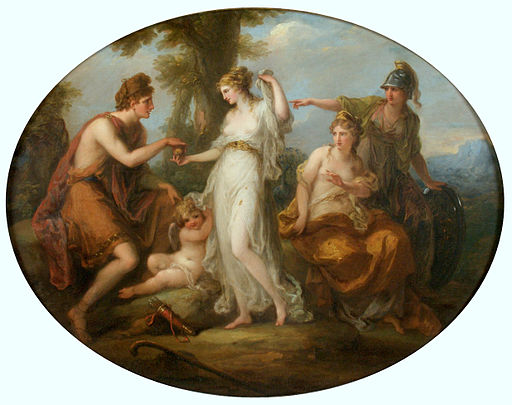And he had no real choice. He had to do as the gods asked. He couldn't say no without endangering himself. And not just because it might offend the three goddesses, but since ZEUS had commanded it, Paris risked offending HIM, too.
 |
| Angelica Kauffman's The Judgment of Paris via Wiki Commons |
Then again, if we're to believe that Zeus basically organized and orchestrated the entirety of the events that would lead to the Trojan War (as some sources allege), then Zeus had to have known exactly what he was doing, sending those goddesses to Paris to begin with--including the outcome of Paris's choice.
Paris was set-up to be the fall-guy for the gods.
All that disdain with which his character is treated basically plays right into their hands. Like a magician's flash of distraction, while he springs the trapdoor in a disappearing act. We have spent three thousand years blaming the victims of Zeus's machinations--between Paris, Helen, and Achilles (the only person who seemed to wake up and recognize the injustice of the whole situation, and we act like he's a sulky teenager and scorn him.)
The idea of Fate and everything it implies is totally WILD (and so is the idea of a omniscient, omnipotent power, because one can't really exist without the other.) And I'll grant you, it's hard to wrap our minds around it all as mortals living a finite existence. Personal responsibility for one's actions is also a thing that matters, a means by which we hold members of the community accountable in the present--In The Present.
But when we're engaging with these myths, we aren't only engaging with the present. We're engaging, also, with the past. And a past that played by different rules than we do, now, in relation to the divine and the gods, the tension between the mortal and the immortal. Acknowledging that the mortals involved LACKED a certain amount of choice, recognizing their limitations, and the role and power of the gods over their lives seems critical to me.
And this is part of why I dislike retellings that excise the gods from the story. Because removing them unravels the entire tapestry when peoples lives and fortunes are dependent upon their engagement and interference.
Without the gods, Paris is a coward who fled the field when facing off against Menelaus in a challenge he couldn't win.
With the gods, knowing he isn't likely to win the challenge, Paris faces Menelaus anyway, and it's ONLY because Aphrodite whisks him from the field that he lives.
(Sidenote: when Hector breaks and runs from Achilles, we give him a pass and treat him still as a hero, but not Paris, who is physically stolen from the field--Paris just gets trashed as a worthless coward. Interesting to consider which characters we are willing to give the benefit of the doubt to and which characters we are inclined to assassinate.)
And all of this brings me back to the question at the heart of my last post:
If you are chosen by a god for ANY reason, can you ever really say no?
Paris sure couldn't.
In the PAST, the periods from which these myths come to us, the answer seems clear.
But what should that mean for the stories we're REtelling in the present?





Amazon | Barnes&Noble | IndieBound
